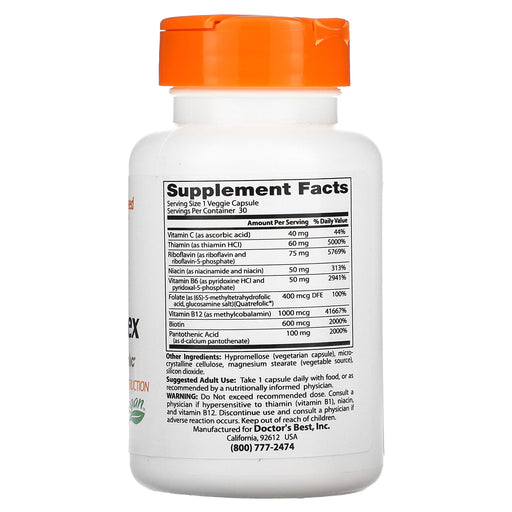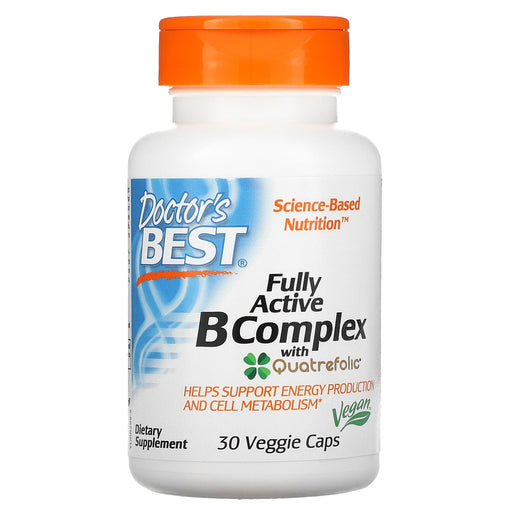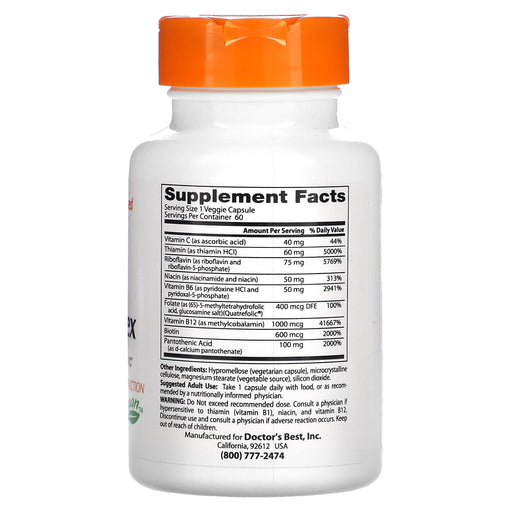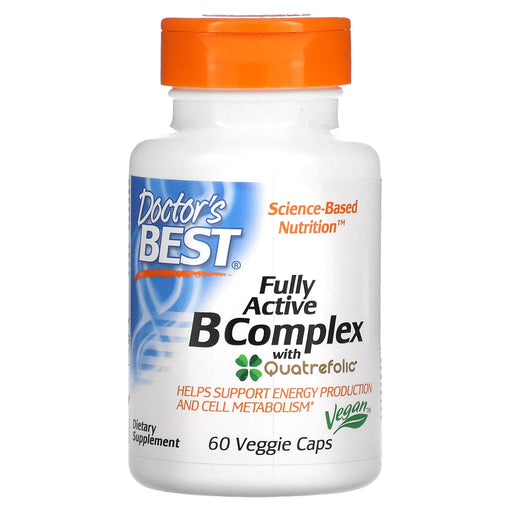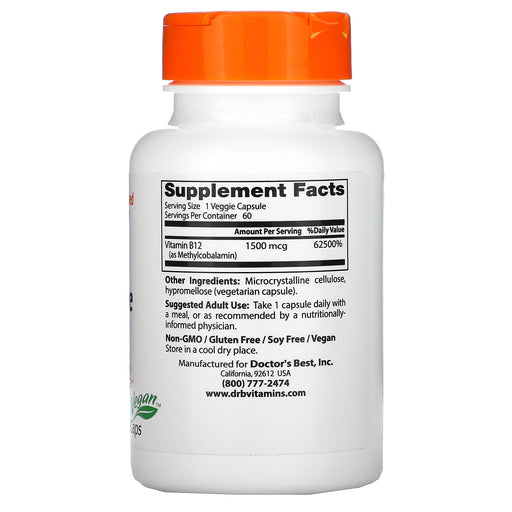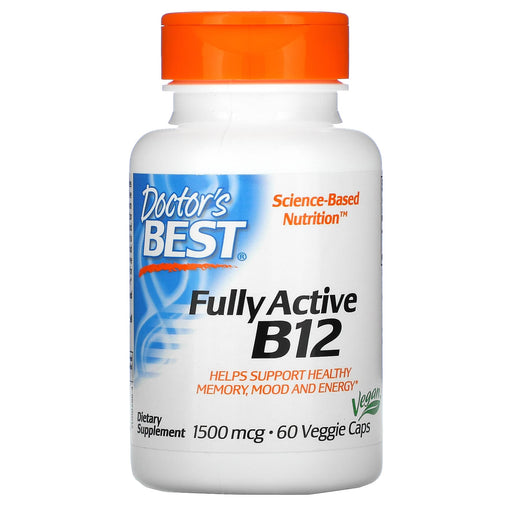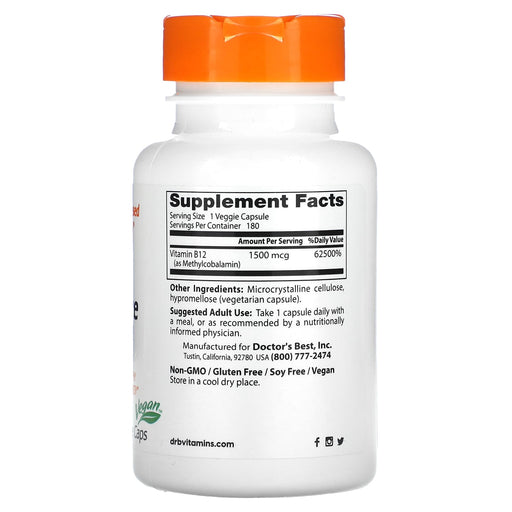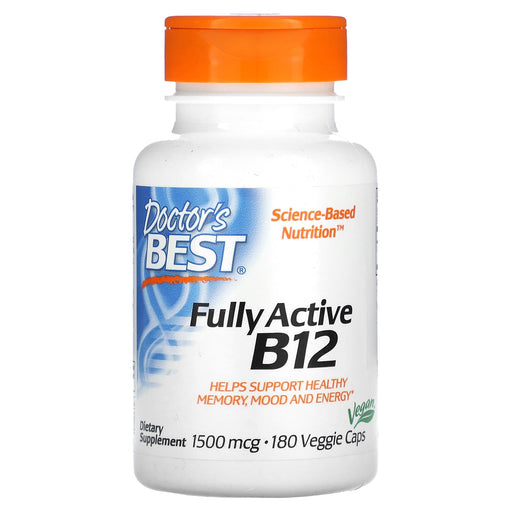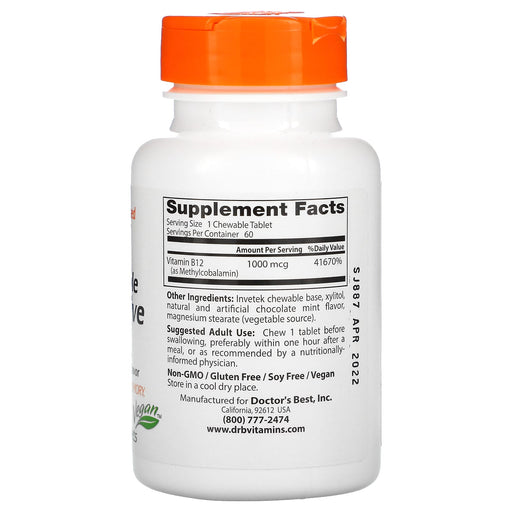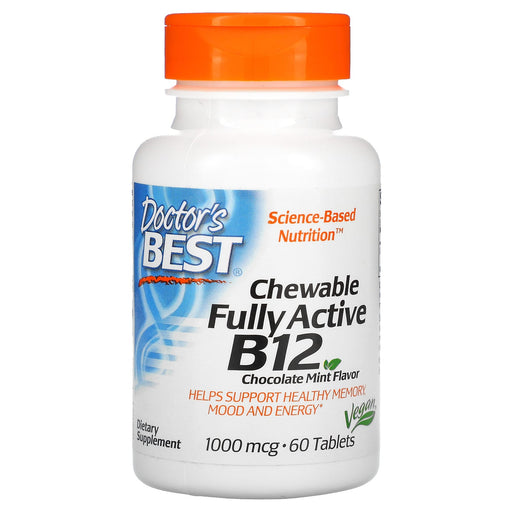
Essential Nutrients for Energy, Metabolism, and Nervous System Health
The Vitamin B complex is a group of eight essential water-soluble vitamins that play crucial roles in various bodily functions, including energy production, metabolism, and nervous system health. By ensuring an adequate intake of these vital nutrients, you can support your overall well-being and help your body function at its best.
Understanding the Vitamin B Complex
The Vitamin B complex includes eight distinct vitamins, each with its own specific functions and benefits:
- Thiamin (B1): Supports energy metabolism, nervous system function, and heart health.
- Riboflavin (B2): Aids in energy production, cellular growth, and the metabolism of fats, carbohydrates, and proteins.
- Niacin (B3): Supports energy metabolism, nervous system function, and skin health.
- Pantothenic Acid (B5): Involved in the synthesis of hormones, neurotransmitters, and red blood cells.
- Pyridoxine (B6): Essential for protein metabolism, red blood cell formation, and nervous system function.
- Biotin (B7): Supports the metabolism of fats, carbohydrates, and proteins, and aids in the maintenance of healthy hair, skin, and nails.
- Folate (B9): Crucial for DNA synthesis, red blood cell formation, and fetal development.
- Cobalamin (B12): Essential for red blood cell formation, nervous system function, and DNA synthesis.
The Benefits of Vitamin B Supplementation
While a balanced diet that includes Vitamin B-rich foods is the best way to ensure adequate intake, some individuals may benefit from Vitamin B supplementation. These include:
- Vegans and Vegetarians: As some B vitamins (particularly B12) are primarily found in animal-derived foods, those following a plant-based diet may need to supplement to ensure adequate intake.
- Older Adults: As we age, our ability to absorb and utilize certain B vitamins (especially B12) may decline, making supplementation important for maintaining optimal health.
- Pregnant and Lactating Women: Folate (B9) is essential for fetal development and the prevention of neural tube defects, making supplementation crucial for women during pregnancy and lactation.
- Individuals with Certain Health Conditions: Certain health conditions, such as celiac disease, Crohn's disease, and alcoholism, can impair the absorption and utilization of B vitamins, making supplementation necessary.
Vitamin B and Related Nutrients
To maximize the benefits of Vitamin B supplementation, consider pairing it with related nutrients that work synergistically to support overall health and well-being, such as:
- Magnesium: This essential mineral is involved in hundreds of enzymatic reactions in the body, including energy production and nervous system function. Combining Vitamin B supplements with Magnesium can help optimize their effectiveness.
- Vitamin C: As an antioxidant, Vitamin C helps protect cells from oxidative stress and supports immune function. Pairing Vitamin B supplements with Vitamin C can provide a comprehensive approach to overall health and well-being.
- Omega-3 Fatty Acids: Omega-3s, particularly EPA and DHA, support brain health and help reduce inflammation. Combining Vitamin B supplements with Omega-3s can further support cognitive function and overall well-being.
Choosing High-Quality Vitamin B Supplements
When selecting a Vitamin B supplement, it's essential to choose a high-quality product from a reputable brand. Consider the following factors:
- Comprehensive Formula: Look for supplements that provide a complete range of B vitamins, including B1, B2, B3, B5, B6, B7, B9, and B12, to ensure a well-rounded approach to Vitamin B supplementation.
- Optimal Dosage: Choose supplements that provide appropriate dosages of each B vitamin based on your age, sex, and health status. Be cautious not to exceed the recommended daily intake, as excessive amounts of certain B vitamins can lead to adverse effects.
- Purity and Quality: Opt for supplements manufactured in GMP-certified facilities, free from contaminants and fillers, and third-party tested for purity and potency.
- Brand Reputation: Select supplements from trusted brands with a history of producing effective, science-backed nutritional products.
Incorporating Vitamin B Supplements into Your Health Regimen
To maximize the benefits of Vitamin B supplementation, consider the following tips:
- Consult with a Healthcare Professional: Before starting any new supplement regimen, consult with a healthcare professional to determine if Vitamin B supplementation is appropriate for your individual needs and health status.
- Pair with a Balanced Diet: While Vitamin B supplements can help ensure adequate intake, they should be used in conjunction with a balanced diet that includes a variety of nutrient-rich foods, such as leafy greens, whole grains, legumes, and lean proteins.
- Consider Timing and Absorption: Some B vitamins, particularly B12, are best absorbed when taken on an empty stomach. Others, like B6, may be better absorbed when taken with a meal. Be sure to follow the recommended dosage instructions for optimal absorption and effectiveness.
Energize Your Body and Mind with Vitamin B
Ready to experience the essential benefits of Vitamin B for your energy, metabolism, and nervous system health? Experience our collection of premium Vitamin B supplements and take the first step towards optimal well-being and vitality.
Our Vitamin B products are carefully formulated with high-quality, bioavailable ingredients to ensure maximum absorption and effectiveness. Whether you're looking for supplement to boost your energy levels, support your metabolism, or maintain a healthy nervous system, our supplements can help you achieve your health goals.
Invest in your health and well-being with the power of Vitamin B. Browse our collection today and unleash the potential of these essential nutrients for your overall health and vitality.
Frequently Asked Questions about Vitamin B
1. Is it good to take vitamin B supplements everyday?
Taking vitamin B supplements daily can be beneficial for some people, particularly those who may be at risk of deficiencies. B vitamins are water-soluble, meaning the body does not store them in large amounts, and excess is excreted through urine. This makes it necessary to replenish B vitamins regularly. However, most people can obtain sufficient B vitamins through a balanced diet. Consult with a healthcare professional to determine if daily supplementation is necessary based on your individual needs and health status.
2. What is the best form of B vitamins to take?
The best form of B vitamins may depend on individual needs and absorption factors. Some common forms include:
- Methylcobalamin: A highly bioavailable form of vitamin B12
- Pyridoxal-5-phosphate (P5P): The active form of vitamin B6
- Riboflavin-5-phosphate: The active form of vitamin B2
- Quatrefolic acid: A highly bioavailable form of folate (vitamin B9)
- Thiamine hydrochloride: A common form of vitamin B1
Look for high-quality, third-party tested supplements that contain these active forms for optimal absorption and utilization in the body.
3. Should I take B12 or B complex?
The choice between vitamin B12 and B complex depends on your specific needs:
- Vitamin B12: Recommended for those with B12 deficiencies, following a vegan or vegetarian diet, or having absorption issues
- B complex: Provides a balanced mix of all B vitamins, beneficial for overall health, energy production, and stress management
If you are deficient in only vitamin B12, a specific B12 supplement may be more appropriate. However, if you want to ensure an adequate intake of all B vitamins, a B complex supplement may be a better choice.
4. Can I take vitamin B1, B6, and B12 together?
Yes, vitamins B1 (thiamine), B6 (pyridoxine), and B12 (cobalamin) can be taken together safely. These vitamins are often found in B complex supplements, as they work synergistically in the body. B1, B6, and B12 play crucial roles in energy metabolism, nervous system function, and red blood cell formation. Taking them together can provide a balanced approach to B vitamin supplementation. However, always follow the recommended dosage and consult with a healthcare professional to ensure safety and appropriateness for your individual needs.
5. What is the best time to take vitamin B1, B6, and B12?
The best time to take vitamins B1, B6, and B12 may depend on the specific supplement and individual preferences. Some general guidelines include:
- With a meal: Taking B vitamins with food can help improve absorption and reduce the risk of stomach discomfort
- In the morning: B vitamins are known for their energy-boosting properties, so taking them in the morning may help promote alertness and mental clarity throughout the day
- Consistency: Stick to a consistent schedule to maintain steady levels of B vitamins in the body
Ultimately, the most important factor is to take B vitamins regularly as directed by your healthcare provider or the supplement label.
6. Can you take B12 and B6 everyday?
Yes, it is generally safe to take vitamins B12 and B6 every day, as they are water-soluble vitamins that are not stored in large amounts in the body. Excess amounts are typically excreted through urine. However, it is essential to follow the recommended daily allowance (RDA) for each vitamin to avoid potential adverse effects:
- Vitamin B12 RDA: 2.4 mcg for adults
- Vitamin B6 RDA: 1.3-1.7 mg for adults
While it is rare, taking excessively high doses of vitamin B6 over an extended period can lead to nerve damage. Always consult with a healthcare professional before starting any supplement regimen.
7. Who should not take vitamin B6?
While vitamin B6 is generally safe for most people when taken in recommended doses, some individuals should exercise caution or avoid taking B6 supplements:
- Those taking certain medications: B6 may interact with drugs like antidepressants, anticonvulsants, and antibiotics
- Individuals with kidney disease or liver dysfunction: These conditions may impair the body's ability to process and excrete excess vitamin B6
- People with a history of allergic reactions to B6: Although rare, some people may experience allergic reactions to vitamin B6 supplements
- Those with a rare genetic disorder called pyridoxine-dependent epilepsy: High doses of B6 may exacerbate this condition
Always consult with a healthcare professional before taking vitamin B6 supplements to ensure safety and appropriateness for your individual health status.


